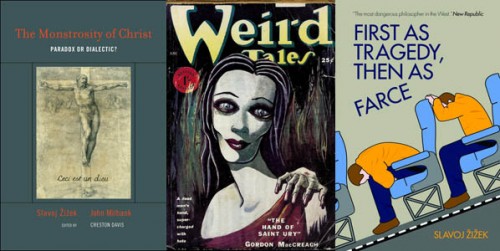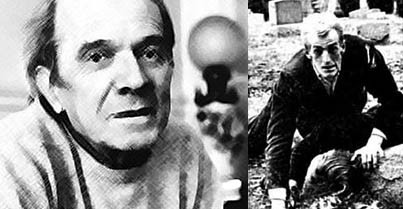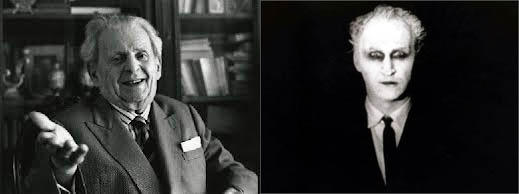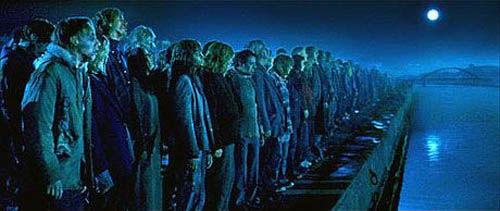PART ONE IS HERE
PART TWO IS HERE
But as ever in such matters, a philosophy, once disavowed, leaves only its worst features behind, its intellectual sludge. Let us take the tally of two important passages from Empire, just to see what they yield. First, there is a passage early in Empire where Hardt and Negri take up a salutary distance from Marx and an old-fashioned Marxist stagism. In particular, they want to do away with any Marxist defense of imperialism, as in: It’s a good thing after all that the British are colonizing India, because colonialism, brutal though it may be, is rooting out Oriental despotism and thus establishing the preconditions for communism. Second, there is the following oddly discursive exclamation: “How hollow the rhetoric of the [early U.S.] Federalists would have been and how inadequate their own ‘new political science’ had they not presupposed [the] vast and mobile threshold of the frontier!” Hardt and Negri, it is important to understand, are sticking up for the idea of the frontier. This sentence comes as part of a long description of the first phase of American constitutionalism, from the Revolution to the Civil War, the Jeffersonian moment, the collective self-making of a frontier society, and the thread that runs through these pages is that whatever has been best about the American experiment depends on the frontier. It is what lends early American politics credibility. Hardt and Negri celebrate the young United States because it was “constantly open to new lines of flight.”
It is necessary, I think, to read these two passages together because in concert they will seem strange and symptomatic where individually each might get overlooked. Hardt and Negri accuse Marx of a certain Eurocentrism and then go off and emulate the master on just this unfortunate point, in precisely the same form. What does it mean to celebrate the frontier? Hardt and Negri make much of the unbounded and open territory of North America:
From the perspective of the new United States, the obstacles to human development are posed by nature, not history—and nature does not present insuperable antagonisms or fixed social relationships. It is a terrain to transform and traverse.
Here, then, is the Marxist defense of colonization, preemptively recanted but unscathed for all that. Need it even be pointed out any longer that the notion of the American continent as “nature,” a wilderness without history, is little more than a murderous cliché, a mental smallpox? Hardt and Negri are claiming that it was the business of colonialism to bring the multitude to the Americas, to unleash its creative potentials in a way that housebound Europeans—but also Indians—could not; “to transform and traverse” nature, where tribal society had merely made an accommodation with it. There’s more in this vein:
The frontier is a frontier of liberty. … Across the great open spaces the constituent tendency wins out over the constitutional decree, the tendency of the immanence of the principle over regulative reflection, and the initiative of the multitude over the centralization of power.
It is the notion of “great open spaces” that is hard to read past. Hardt and Negri turn on its head one of the commonplaces of Marxist history-writing by preferring the American Revolution to the French, holding it out as the Left’s proper spur and model. The problem is that their entire account of the United States depends on this notion of open space, which they sometimes hedge—“empty (or emptied)”—but which they usually just repeat. It has to be said: The notion of “open space” is simply a lie, and I’m not sure what we gain from treating it any differently. Or rather, I think I know what we gain, but the gain itself is disheartening. What we gain is the Deleuzian world of the multitude, the smooth, open world of flows and unconstricted movement. But then what Hardt and Negri are secretly conceding in those parentheses is that the world is never smooth; it must be made smooth. The world is not open, it must be opened, which is to say evacuated. This is where their covert Hegelianism does its scariest work. What Deleuze tends to describe as though it were an ontological guarantee is actually the outcome of contingent and lethal historical processes—or maybe Hardt and Negri would say that they are not contingent, but then they really have written a Philosophy of History. The multitude—and not just empire (or Empire)—has mass death as its historical precondition. In order for Hardt and Negri’s philosophical argument to be true—in order for it to come true in the really-existing world—Indian removal has to happen first.
One might say in Hardt and Negri’s defense that they don’t shrug off mass death; they point right to it. The indigenous, they note, “existed outside the Constitution as its negative foundation”; republicanism in practice was actually pretty bruising. But then, of course, Marx makes the same concession for India. The problem is that they don’t let this admission exert any pressure on the lines of their argument. They include a few sentences on the American holocaust as though merely mentioning demonstrated due historical diligence and then go on to write sentences that seem predicated on its not having happened after all. If you want to face up to the history of colonization, however, you have at least two options: You might say, as Hardt and Negri’s scheme seems to require, that the Indians were the necessary victims of a Hegelian world history of the multitude, which began its highest stage in the Americas, where the (European) multitude-in-itself became the multitude-for-itself, the self-producing subject/object of history. Even Lukács would blush.
Alternately, you can get used to the idea that the material history of the extermination unmasks American republicanism as self-deceiving. Hardt and Negri’s embrace of the Machiavellian or Jeffersonian republican is their philosophy’s weakest strut, depending as it does on an utterly untenable antithesis between republicanism and sovereignty. Hardt and Negri have a lot riding on classical republicanism, the republicanism of Florence and the revolutionary Atlantic; it is supposed to provide autonomia with the dignity of historical precedence, which is also to say that it is supposed to wean today’s social-democratic Left of its fatal attachment to the state. But this republicanism was itself never anything less than imperialist, a republicanism of dispossession and the plantation. Early English republicanism was a species of political economy. Its most distinctive feature was a theory of agrarian virtue, which argued that a flourishing polity would draw on the capacities of all its citizens. In order for those capacities to remain intact, however, citizens would have to cling to their autonomy, to steer clear of the corrupting ties of commercial and political dependence. And if citizens were to remain autonomous, each would need a plot of land to cultivate; crops and livestock would be the guarantee of economic and thus political independence. This means that republicanism thought of itself from the very beginning as expansive, as requiring ever more land to produce ever greater numbers of virtuous citizens, and when we consult the history books on this score, we find many different versions of the republican land-grab: we find England’s seventeenth-century radicals taking refuge from Cromwell in Ireland, where they dreamt of expropriating the natives; we find England’s revolutionary government engineering a dreadful new organization of labor around the entire Atlantic basin; we find both Machiavelli and Harrington calling for free and democratic republics to conquer other nations. Nothing is easier to undo than the distinction between republic and empire. It is a gross simplification to chalk the entire history of political crime up to Hobbes.
So what does gay science want from you? Among other things, it wants you not to be an Indian. It wants you, in fact, to stop talking about Indians. We can turn, at this point, to a defense of Nietzsche that Michael Hardt wrote some years before Empire. The continuing importance of Nietzsche, he offers, is that he is not Hegel. Nietzsche points the way out of the dialectic, to a non-dialectical form of negation, “an absolutely destructive negation that spares nothing from its force and recuperates nothing from its enemy; it must be an absolute aggression that offers no pardons, takes no prisoners, pillages no goods; it must mark the death of the enemy, with no resurrection.” It is hard to know how to respond to the exterminationist fantasy set loose in these lines, except to point out that this, too, is gay science: Nietzsche is to be preferred to Hegel because he is Hiroshima. The only passage in the pages of Deleuzian Marxism more dumbfounding than this is Eugene Holland’s defense of the enclosure movement—the centuries-long expropriation and immiseration of Europe’s peasantry—as deterritorialization, as the peasantry’s liberation, in other words, a kind of historical free jazz improvised on the bodies of the poor. Hardt and Negri, in turn, offer a defense of the poor that is at once Deleuzian and Franciscan, and it is one of their loveliest passages: “The poor itself is power. There is World Poverty, but there is above all World Possibility, and only the poor are capable of this. … The dominant stream of the Marxist tradition, however, has always hated the poor, precisely for their being ‘free as birds’”—in context, this key Marxist epithet takes on overtones of Francesco preaching to the sparrows. But even this splendid argument has as it grim corollary the insinuated case that only the destitute can be properly militant, that anyone with any patch of land, no matter how meager, is to be written off as a kulak, still waiting for the deterritorialization that will set him free. In Multitude, their follow-up to Empire, Hardt and Negri spell it out: “The figure of the peasant may pose the greatest challenge for the concept of the multitude.” The dissolution of peasant societies, the converging of all life on advanced capitalist forms of production, “is one condition that makes possible the existence of the multitude.” Peasants die so that the multitude may live.
There are weighty philosophical matters at issue here. One of the stock charges filed against Hegel is that he functionalizes negation; that is, he sees all negativity as having functions—philosophically, for a start, but also historically—in a manner that justifies all mass-killing as progress, redescribes every invasion as an encounter and every conquest as a fusion. Negation becomes the path through history. The alternative to such high-minded apologetics might seem to be a Deleuzian or Nietzschean philosophy without negativity. But it turns out to be remarkably hard, at this level, to tell the difference between the Hegelian approach and the Nietzschean. Consider Book IV of the Gay Science, which contains some of the most Deleuzian, yea-saying passages that Nietzsche ever wrote. It is in these pages that Nietzsche raises the bar on the notion of a philosophy without negativity. I will have to learn, Nietzsche writes, to make do without critique of any kind. I do not want to accuse; I will not even accuse the accusers; I will so distance myself from ressentiment that not even ressentiment will vex me. Then, scattered about the next two books, we find a whole series of passages in which Nietzsche goes out of his way to praise all those things we normally think of him as seething against: Religion is a dynamic force in history; it serves life. Morality is a dynamic and creative force in history; it, too, serves life. These passages are all offered as lessons in what it means not to accuse the accusers. And then at 307, Nietzsche makes a crucial argument: Negativity itself is not negative; it is creative and life-serving. Nietzsche has lain bare the very mechanism by which negativity gets functionalized. Anti-Hegelianism, as the negation of the negation, becomes indistinguishable from its antithesis, just as Hegelianism is easily understood as a Deleuzian philosophy without negativity, if Hegel’s point is that negation (contradiction or the limit) always yields some new, positive term. Everything is positive: Massacres are positive, subjugation is positive. “We do not intend here to weep over the destruction and expropriation that capitalism continually operates across the world…”
It is, finally, one of the strangest features of Hardt and Negri’s writing that an argument whose historical horizon is largely medieval should at the same time be so progressivist, calling for “new barbarians” on one page and glossing over the near-extermination of Native America on the next. Hardt and Negri may be the new Goths, but they are also the new Whigs—odd, no doubt, but there is all manner of precedent for this unlikely combination. In its earliest seventeenth- and eighteenth-century formulations, radical Whig ideology was medievalizing through and through. The notion here was that the ancient Saxons had practiced a rough and spontaneous republicanism, which had been terminated only by the Norman Conquest and the imposition of French tyrannies—monarchy, aristocracy, sovereignty. The original program of Whig radicalism, then, was directed at the progressive recovery of the primal liberties of Mercia and Wessex. England was to be at last decolonized, made Gothic again—you might think of this as an English-republican version of primitive (African or Latin American) communism and you wouldn’t be far off the mark. Hardt and Negri’s medievalist fantasies are actually of a piece with their conspicuous attachment to early modern political theory, which entertained medievalist fantasies of its own. This attachment is so pronounced, in fact, that Hardt and Negri sometimes seem to think of the present as part of some very long seventeenth century: In order to make sense of the present, they instruct us in Multitude, we will need to understand Hobbes, the English Interregnum, the enclosure movement, the battle between absolutism and aristocracy, the Baroque, and curiosity cabinets. But then what is the upshot of this seventeenth-century short course? For this we can look to Negri, who is fond of a formulation that he has borrowed from the following century’s Edmund Burke. Again and again, Negri praises the early North American colonists as “English Tartars,” praises their “Tartar sense of freedom.” The still Deleuzian claim here is that it is the English colonists who were the continent’s real nomads, its real tribesmen or better Indians, its glorious, rampaging savages. One is permitted to wonder whether any of this is much of an advance for a communism—to unseat Lenin only to put Leatherstocking in his place.
One important question remains: Does a Deleuzian politics bear some exceptional animus towards peasants and indigenous peoples? Does the multitude become universal only when these two classes are no longer around to exclude? Or is there some broader process by which the multitude can expel various groups, and not just Burundian subsistence farmers and the Hopi, from its not-so-general assembly? It’s hard to say. The important thing to know about Commonwealth, the third volume in Hardt and Negri’s trilogy, is that it is largely an exercise in auto-critique, full of qualifications and concessions and takebacks—full of claims, I mean, that we don’t much associate with Hardt and Negri: that the Left needs to stop talking so much about sovereignty and to start thinking about capitalism again; that vitalism is a politically ambiguous ontology booby-trapped with openings to authoritarianism; that often it will not be enough to flee the scene of one’s oppression, that sometimes one will have to fight. It is in this spirit of revision that Hardt and Negri undertake in Commonwealth to clear some space in the multitude for native people after all, sticking up, via Mariátegui, for the indigenous commons and the figure of the emancipated Indian, provided, however, that an Andean communism is not understood as authentically precolonial but appears instead as resistance to colonization, hence as an act of self-modernization. They even call out “liberal oligarchies throughout Latin America” for “mobilizing a … ‘race-blind’ ideology, attempting to Hispanicize the indigenous population with the goal of eradicating the ‘Indian’—through education, intermarriage, and migration.” The problem even here, though, is that Hardt and Negri have already in the same volume said that they also favor indigenous people when they have been in large part de-indigenized, and this predilection will now squat incoherently alongside their attack on neoliberalism. The Oneida and the Spokane are always going to have a hard time joining the multitude, for the simple reason that I can name them as such; those names—rival identifications, really, and imperfectly transferable to regions outside the eastern Great Lakes or inland Washington—will retard the entry of the indigenous into the universal non-class. Preferable, then, are “mestizas/mestizos, Black Indians, ‘half-breeds,’ Indians excluded from their tribes and other hybrid figures, constantly moving across borders through the desert.” The issue isn’t just that this list is the American Southwest transparently re-described as Glissant’s Caribbean. The issue is that even on the evidence of Hardt and Negri’s own rhetoric the program of the multitude coincides with the neoliberalism that it claims to oppose: Neoliberals should be chided for encouraging Indians to intermarry, but the multitude deserves praise for preferring breeds to bloods. Latin American elites harry indigenous populations by forcing them to migrate, but an ontology of becoming requires its Indians to be in perpetual motion anyway. What on one page Hardt and Negri call “becoming-multitude” they before long rename “eradication.”
So a Deleuzian Marxism has special problems comprehending native people. Even its most direct overtures to the indigenous end up misdelivered. But then it’s not clear whether any of us, native or otherwise, were ever going to make it into the multitude anyway, whatever its putative universalism. This is the issue that anyone who refuses to talk about Deleuze’s Hegelianism will be unable to face squarely. But then Deleuze’s debt to Hegel is so naked that it should be difficult not to talk about: Nothing is more central to Deleuze’s thinking than the idea that philosophy is a project of de-reification. To the philosopher’s gaze, “the actual object dissolves.” Metaphysics should help us discern the processes that “reconvert object into subject,” and it is important not to read this last word—“subject”—as meaning “the human,” since any such dereifying process “has only the virtual as its subject.” Ontology, then, will direct our attention towards the virtual as cosmic Master Subject; I might recommend that we go ahead and call this cosmic subject Geist, but then it turns out Deleuze already has, in the second Cinema book: “Subjectivity is never ours, it is time’s, that is, soul, spirit, the virtual.” If we follow the route of philosophy and learn to think from the position of this more-than-human spirit-subject—from what Deleuze calls the position of the “the virtual Whole”—then we will undergo the “becoming-God of the human, a becoming infinite of the finite.” This particular becoming is what Deleuze and Guattari call their “eschatology,” “the apocalypse,” la fin. To help history achieve its proper endpoint, one will have to assist in the world’s derealization; philosophically educated people, in other words, will have to become “the manservants of the abstract”—will have to develop a “passion for abstraction.” That so many readers have nonetheless declared Deleuze and Guattari materialists goes back, I think, to a nifty rhetorical trick, whereby they seem again and again to affirm the materiality of the worldly terms that they actually mean to liquidate, simply be retaining the corporeal names for such terms even in their liquidated form, such that the negated body becomes “the body without organs,” negated space becomes “perfectly smooth space,” and so on. Of course, Deleuze and Guattari don’t think of such liquidated terms as in any sense outside of the world, but what we’ll want to note all the same is that once translated back into a materialist frame—once declared immanent—such abstractions, which Deluze sometimes calls “the Idea,” are to be preferred to any of their more determinate rivals. The becoming world aspires to the condition of the sloshing sea, or of desert light, or indeed of thought itself, which is after all of non-things the most glabrous. “When people are asked to apprehend some concept, they often complain that they do not know what they have to think. … The mind, denied the use of its familiar ideas, feels the ground where it once stood firm and at home taken away from beneath it, and, when transported into the region of pure thought, cannot tell where in the world it is.” Philosophy as liberating groundlessness, disorientation, abduction—that’s paragraph 3 in Hegel’s shorter Logic.
It is in this context that we must evaluate the key role that Hardt and Negri assign to “the immaterial.” That word gets us, indeed, to one of their most oft-repeated claims: that “immaterial labor” and the making of intangible goods are the present’s big opening onto communism, which will accordingly be an immaterial communism, an ethereal politics for a derealized socius. It might be hard, at first, to know what Hardt and Negri mean by this work-without-matter, but all you have to do to grasp their meaning is gather together the near-synonyms that typically, in Empire and its sequels, appear alongside the word “immaterial”: “linguistic,” “communicational,” “intellectual,” “cognitive,” “affective.” At its baldest, Hardt and Negri’s account of “immaterial labor” amounts to the claim that we are all culture workers now—that we are all producers of text and image and saleable experience—and that all work on the planet has come to resemble, more or less, a media job. From this claim follows two others: that intellectual labor has a special knack for eluding the old modes of industrial labor discipline (which is good news, since all labor now tends towards the condition of intellectual labor); and that immaterial goods make communism possible because they can easily become common—because, that is, ideas, images, and the like are directly shareable and so exempt from logics of scarcity. The argument, we’ll want to note, is implausible at every point: No-one with knowledge of Korean animation factories—or of Barry Gordon’s Motown, for that matter—could claim that culture-work has ever been impervious to Taylorization. Nor are those who drive UPS trucks likely to agree that all work in the present involves novel degrees of thought and art. More important, it is difficult to see how Hardt and Negri’s claims about immaterial production could ever be generalized. When they claim that communism is at hand because mp3’s and jpeg’s can by copied without limit, one wishes naturally to ask whether they also have plans for the sharing out of things that are not in the same sense copyable: rain boots, ethambutol, rice. And when they have repeated the bit about the mp3’s for the sixth or seventh time, one simply concludes that they have no idea what to do about the rice—that communism, in other words, will be immaterial or it will be nothing. A communism thus de-realized loses its will to propagate material things, and the multitude that is this communism’s group-subject has no need of the people still fated to make and service such things. Go back to those adjectives: Your place in the multitude depends to some large degree on your being able to describe your job as “intellectual,” communicative,” or “cognitive”—to your producing “images, codes, knowledges, affects.” A communism for the creative classes wriggles free of its dependence on the old European proletariat; such is doubtless a large part of its appeal. It also does without Chinese garment workers, Amazon warehouse wallahs, and Turkish strawberry pickers.
At this point, it becomes important to hold apart two distinct arguments we might make about transversal philosophy and schizo-Marxism. We can hail Deleuzian thought, in eulogy, as one of the great emancipatory projects of its generation and still want to explain our disappointment with its course. We know that Anti-Oedipus took 1968 as its prompt, because its authors tell as much; and we know that the most important sections of A Thousand Plateaus were first published in the lead-up to the Italian Movement of 1977 and the Bologna uprising, which huzzah’d Guattari as one of its teachers and heroes. We will need the intellectual historians and sociologists of knowledge to explain to us, then, how such books have ended up in the appreciative hands of the Israeli Defense Forces and the dot-com philosophers of the utopian-but-profitable Internet. It will not be enough to say that the Israeli military is “abusing” Deleuze by “taking his ideas out of context”—or that the paid poets of web and wire are “appropriating” schizoanalysis by putting it to non-Deleuzian ends. A theory that expects thought to be divvied up, composted, and recycled—a theory that, indeed, prefers thought when it is mobile, beyond itself, and out of context—confers no authority on those who would object to its repurposing. Anyone who says that Deleuze and Guattari need to be “reclaimed”—that they need to be retrieved and led back to their proper place—is defending his masters in terms they would not recognize. So we might instead frame our disappointment with Deleuze as a simple matter of theory and practice, and this in some classical sense: Deleuze and Guattari recommended rhizomes to us; we have tried them out at some length, typically in the form of “networks”; and we can say now upon reflection that they just aren’t working out, that they have never been as smooth as promised, never as horizontal in their growth. Networks continue to generate winners and losers. Our yams all have lumps. We might not have known in 1980 that a world of maximally deregulated flows—the Deleuzian pure economy uncontaminated by power—wasn’t much more than the left-wing path to neoliberalism, but there is no excuse for not knowing that now.
So that’s one way to refresh your thinking about Deleuze: You can chart who has been reading him in the generation since his death, and this ecumenically, taking care to expand the list beyond the people you went to graduate school with; you can note who sounds most like Deleuze even when they don’t cite him; and you can identify their institutional affiliations and the audiences they seem to be addressing. At that point, you will likely be forced to conclude that the ostensibly dissident Deleuze bubble inside the academy has coincided with a not-at-all dissident network bubble outside of it—with, I mean, the inflation of the word “network” to one of our generation’s master terms. What I would like to suggest now, though, is that we could also just go back and read Deleuze and Guattari again, paying careful attention to their political rhetoric, bringing forward their many historical claims, taking seriously their notion that some polities—some types of polity and not others—have been the proper vehicle of the élan vital. And if we do that, then we will see that we needn’t have been all that surprised by the emergence of what some future intellectual historian is bound to call Right Deleuzianism. It would have been enough to read the books, since the core Deleuzians all verbally champion versions of the administered society; they have been imaginatively invested in such systems, persistently and throughout their writings. Saying as much also means that we will have to get the periodization right, and here, too, the task is to avoid a certain belatedness. For we didn’t have to wait for an advanced post-Fordism to discover that Deleuze had been hijacked (because every Stanford grad now thinks he’s a silicon nomad, &c). It wasn’t a hijacking. All the Deleuzian theorists ask, if sometimes only in passing, which forms of government—or perhaps non-government—are in keeping with the rhizome or horizontal network of becoming. It is wholly misleading, in this context, to talk about Deleuzian “anarchism,” as most readers casually do, since the polity that Deleuze and Guattari themselves most often advert to is not autonomia, but its opposite, which is empire.
We need to proceed slowly here. Hardt and Negri are nakedly urban and indeed “metropolitan” in their political preferences: “The metropolis might be considered … the skeleton and spinal cord of the multitude. … The metropolis is to the multitude what the factory was to the industrial working class.” Not the reservation, village, or town; not even the regional city or small-nation capital; the metropolis. There are few passages in which the Empire trilogy so gracelessly abrogates its own universalism. To be part of the multitude you actually have to live in a particular kind of place. There will be no communism on the periphery, or at best a weedier version of it. But Deleuze and Guattari argue nothing of the sort. Indeed, this is where Hardt and Negri might seem to be least like their forebears, whose geographical imaginations tend rather towards the pastoral and the outlying—towards Berbers and deserts and the steppe. If we’re tracking intellectual debts, we can say that Deleuze and Guattari often draw on political anthropology and especially on those anarchist anthropologists who have helped us all understand how it is that societies can thrive even in the absence of formalized government. Some tribal societies, we read in A Thousand Plateaus, have been wholly knowing about their headlessness, embarked on a political project to resist the state—not just pre-state, by the ticking of some some civilizational and evolutionary timeline, and so fated to pass from big man to chief to king, but actively anti-state. They also repeat the claims of sexual anthropology in the mode of Malinowski, Mead, and Reich, to the effect that tribal people have been spared repression, sexual constriction, and neurosis: “in the primitive socius desire is not yet trapped.” Mostly, though, their non-metropolitan bent appears not as a set of borrowed ethnographic claims, which one might ask an anthropologist colleague to confirm or disconfirm, but as a pervasive idiom or ethnically ecstatic prose style. If you feel that Hardt and Negri’s position smacks too much of Paris-London-Berlin, you might find that you prefer Deleuze and Negri’s version of what are after all mostly the same arguments, though this will depend largely on your tolerance for Euro-primitivism and philo-Orientalism. Here are some claims from Capitalism and Schizophrenia.
-“There is much of the East in Kleist.”
-All things open to the world, capable of self-organization and self-transformation, are “like Arabs or Indians.”
-“The Orient” is a name for any smooth space. So is “the Sahara.”
-Central African “medicine men” already perform schizoanalysis on village neurotics.
-This Id is “peopled” with “races and tribes,” “swarming, teeming, ferment, intensities.” This makes black people and Kalmyks akin to what “passes through the veins of a drug addict.”
-“I am a beast, a n****r”—that’s Rimbaud, quoted to vigorous nodding.
-Asia is to be preferred to Europe because “the East” has no trees. Or perhaps there are some trees in Asia, but Asians themselves act as if there weren’t, shunning trunk and branch, unseduced by arborescence. And the people of the East neither cultivate stemmy plants (no upward-growing crops for the Khmer!), nor keep livestock in their villages.
-“I return from my tribes. As of today, I am the adoptive son of fifteen tribes, no more, no less. And they in turn are my adopted tribes, for I love each of them more than if I had been born into it.”
Perhaps you’ve already decided that this list isn’t all that interesting, that it’s all just so much standard-issue négritude blanche. You’d have a point, but even so you might want to linger over that last entry long enough to register, first, that those sentences make most sense if spoken by a metropolitan and non-native: I return from Indian country (and to France or Britain or Boston); and second, that its attitude is oddly possessive: MY tribes—the stance, then, of an adventurer and collector and ethno-tourist. And once you’ve spotted this, it becomes harder to say that Negri is metropolitan and Deleuze isn’t. Indeed, what is distinctive about schizoanalysis or rhizomatic thought—what distinguishes these latter from a generic French Third Worldism—is that Deleuze so often lets his enthusiasm for tribes and nomads slide into an enthusiasm for empire itself. By some transitive property, the colonizers take on the virtues of the colonized; the French and British empires take on the virtues of stateless societies. I’ll let Deleuze and Guattari tell it:
-“The rhizome operates by variation, expansion, conquest, capture, offshoots.”
-“In one way or the other, the animal is more a fleer than a fighter, but its flights are also conquests, creations.”
-Europeans must learn to adopt “the American meaning of frontiers: something to go beyond, limits to cross over, flows to set in motion, noncoded spaces to enter.”
-“Kipling understood the call of the wolves, their libidinal meaning, better than Freud.”
-“England … is Germany’s obsession, for the English are precisely those nomads who treat the plane of immanence as a movable and moving ground, a field of radical experience, an archipelagian world where they are happy to pitch their tents from island to island and over the sea. The English nomadize over the old Greek earth, broken up, fractalized, and extended to the universe. … The English inhabit. For them a tent is all that is needed.”
-The French colonies in Africa were an “open social field” in which black people demonstrated how sexually liberated they were by dreaming about “being beaten by a white man.”
-Anti-imperialism was a neurotic condition. Left to their own devices, that is, tribal people were not neurotic. Under colonial conditions, however, some of them became neurotic: “the elders who curse the White man, the young people who enter into a political struggle.”
To this list I need to add two observations that cannot be discretely quoted:
-The third chapter of A Thousand Plateaus is presented as a lecture by a fictional character, whom the authors present as their great Edwardian predecessor, the one who “invented a discipline he referred to by various names: rhizomatics, stratoanalysis, schizoanalysis, nomadology, micropolitics, pragmatics, the science of multiplicities.” But this character, Professor Challenger, is not Deleuze and Guattari’s invention; he’s been borrowed rather from Arthur Conan Doyle, whose most famous Challenger story recounts how the professor defeated a horde of “ape-men” with the help of a “devoted negro.” Forget Spinoza, in other words: Deleuze and Guattari appoint as their own tutor and co-author one of the heroes of imperial adventure fiction.
-Deleuze dedicated an entire, standalone essay to a British-imperial war planner, a spy in lands that the British would later colonize and re-settle, a colonel in the British Army and advisor to Winston Churchill in that country’s Colonial Office. This figure is held out to the reader as a model to be emulated, one of history’s great schizos, “making Spinoza’s formula his own,” an avatar of creative becoming, a creature of “pure intensity” with “a dissolved ego” and a “gift for making entities live passionately in the desert, alongside people and things, in the jerking rhythm of a camel’s gait.” T. E. Lawrence possessed a “disposition” towards non-identity “which led him far from his own country.”
What we’ll have to say at this point is that colonialism was always Deleuze’s preferred rhizome. This could, I realize, seem perplexing. His followers certainly write in denial and disbelief. “He made only occasional passing remarks about colonization,” observes one of his translators—of a philosopher who seems in fact to have written about little else. But let’s grant the Deleuzians their turmoil. From some angles, the coincidence of anarchy and colonization will be the biggest puzzle in all of rhizomatic thought. But that coincidence is, in fact, anchored in arguments that Deleuze and Guattari make and is thus not just a fluke of their rhetoric. The treatise on nomadology begins by arguing, on the authority of Pierre Clastres, that war is radically opposed to the state: War and the state are opposed principles or antitheses. You probably consider war to be one of those few activities that governments strictly reserve for themselves, but you’d be wrong. War is, properly considered, outside of the state. At first you might think that this claim, on the face of it absurd, is just one more instance of Deleuzian pataphysics, something on the order of in-Asia-there-are-no-trees. But there is actually a case to be made here, a case in some respects quite astute. The point is most clearly grasped in terms of political philosophy, for what Deleuze and Guattari have done is identify a weakness in Hobbesean accounts of sovereignty, one of whose more widely accepted claims is that states should (and do) establish a monopoly on force. But what does one ever mean by “monopoly on force”? What could one ever mean? What we usually mean is that the only members of a society who are licensed to use violence against others have been authorized to do so by government, that they tackle and clobber only in the state’s name. But as soon as we say this, we have already made a big concession, which is that the sovereign does not, in fact, possess a monopoly on force—the king or president does not sit in chamber holstering the nation’s only gun—but requires miscellaneous armed proxies and deputies: cops, sheriffs, marshals, soldiers. The monopoly on force inevitably involves the extensive sharing-out of force and is thus never a monopoly. To this argument, Deleuze and Guattari append an observation borrowed from historical sociology, to the effect that in tribal societies, war is what puts adult men in motion, preventing them from sinking back into stasis and statehood and bourgeois inertia; that’s an argument whose medievalizing versions get attached to names like Lancelot and Sir Gawain. It is during war that a nation’s citizens, armed and abroad, are least under sovereign review. This reasoning, at any rate, is what produces the distinctively Deleuzian defense of empire, since if you hold that warfare is antithetical to government, then you might be justified in arguing that colonization was not the extension of the European states; it was their antithesis and negation—in some literal and liberated sense outside of them. Anarchism is one name for a politics against the state, and it is mentioned in Capitalism and Schizophrenia basically not at all. Its other, less familiar name is empire, and it, unlike Kropotkin and Emma Goldman, appears on nearly every page.
But then what of the home front? Does the Deleuzian account of Europe and North America seem any more credible than the Deleuzian account of Senegal or Lebanon? Not really. Ultimately, the various versions of gay science all go back to a puzzling misdiagnosis of capitalism—our capitalism, Northern and consumer capitalism—as ascetic. It is only in the face of renunciation that joy seems like a political program in its own right. But the Weberian account of an austere and Puritanical capitalism was always a partial observation and has long since been rendered historically obsolete. The better life will require of us more than that we moon Benjamin Franklin. Of course, there is a special sense in which even consumer capitalism really is ascetic. The pleasures that it offers are secretly a form of work, just so much recapitulated labor, an administered leisure characterized by routine and command—“must-see TV,” they call it. But then this is a trick that consumer capitalism actually shares with Deleuzian thought and especially with Deleuze and Guattari’s own prose—this ecstasy that is really effort. Anti-Oedipal prose wants to register as delirious, but most casual readers find the style exhausting, a buffeting, disoriented prose of parataxis and unelucidated concepts. Deleuze’s defenders call it a writing experiment and ask that we acclimate to it in small doses. But the prose signals, I think, a properly political dilemma. Deleuzian politics is an endless orgasm of irrepressible creativity and productivity and wandering; it grants no calm or sanctuary, and the prose merely rehearses in advance this particular punishment, which does not know how to distinguish between the nomad and the refugee, between a line of flight and a death march. The reader tossing aside A Thousand Plateaus in frustration is already rejecting the Deleuzian dystopia, this coerced restlessness, this constant coupling of organs, this jumble of part-objects in indiscriminate connection, this drubbing that calls itself joy.
A FEW NOTES
-Deleuze and Guattari’s biographer quotes the former, speaking in 1988: “We, Félix and I, always fancied a universal history, which he [Foucault] hated.”
-If you have any doubts about what it took for North America to appear as “empty,” have a look at David Stannard’s American Holocaust (Oxford: Oxford University Press, 1992).
-To get a handle on the colonial dimensions of English republicanism, you might begin with Robert Brenner’s Merchants and Revolution: Commercial Change, Political Conflict, and London’s Overseas Traders, 1550-1653 (London: Verso 2003); Peter Linebaugh and Marcus Rediker’s Many-Headed Hydra: Sailors, Slaves, Commoners, and the Hidden History of the Revolutionary Atlantic (Boston: Beacon, 2000).
-All my Hegel-talk risks being a bit misleading. The differences between Hegel and Deleuze would in most contexts be more important than their similarities, since Hegel points our attention towards achieved complexity and does not use “abstract” as a term of praise. A kind of hyperdetermination, the coexistence in a single order of all the determinations and potentialities-now-made-real, is to be preferred to the lack of determination. When all is said and done, the Deleuzian eschatology owes more to Schlegel or the 1790s Fichte; what is rhetorically curious is that Deleuze, in order to communicate Schlegelian positions, compulsively poaches so many motifs from a textbook French Hegel that he claims to have surpassed.
-Eugene Holland says that the expropriation of the English peasants was their deterritorialization. In this, he has merely found a historically more proximate instance of a claim that Deleuze and Guattari make about the Roman Empire in Anti-Oedipus, that it “decoded the producers through expropriation.”
-On Whig medievalism, see Christopher Hill’s “The Norman Yoke,” in Puritanism and Revolution (pp. 50-122); Samuel Kliger, The Goths in England (New York: Octagon, 1972); J.G.A. Pocock, The Ancient Constitution and the Feudal Law (Cambridge: Cambridge University Press, 1987, rev. ed.); R.J. Smith, The Gothic Bequest: Medieval Institutions in British Thought, 1688-1863 (Cambridge: Cambridge, 1987).
-Anarchists have long been prone to imagine themselves as white Indians, Indian fighters, and Davy Crocketts. In the late 1970s, some Italian autonomists took to calling themselves the Indiani Metropolitani. And here’s Bakunin writing to the Russian tsar: “In my nature … there has always been a basic flaw…. Most men seek tranquility; in me, however, it produces only despair. My spirit is in constant turmoil, demanding action, movement, and life. I should have been born somewhere in the American forests, among the settlers of the West, where civilization has hardly begun to blossom and where life is an endless struggle against untamed people, against untamed nature—and not in an organized civic society.” (qtd in Gornick’s Goldman bio, p. 44)
-One might “conclude that the ostensibly dissident Deleuze bubble inside the academy has coincided with a not-at-all dissident network bubble outside of it—with, I mean, the inflation of the word ‘network’ to one of our generation’s master terms.” The person I have heard say this most clearly is Alexander Galloway. Ask to see his unpublished “Forget Deleuze.”










